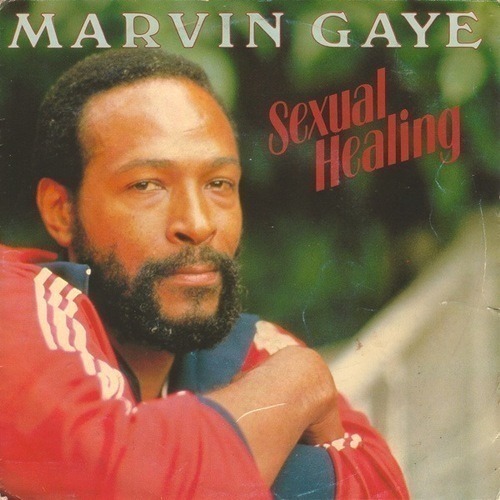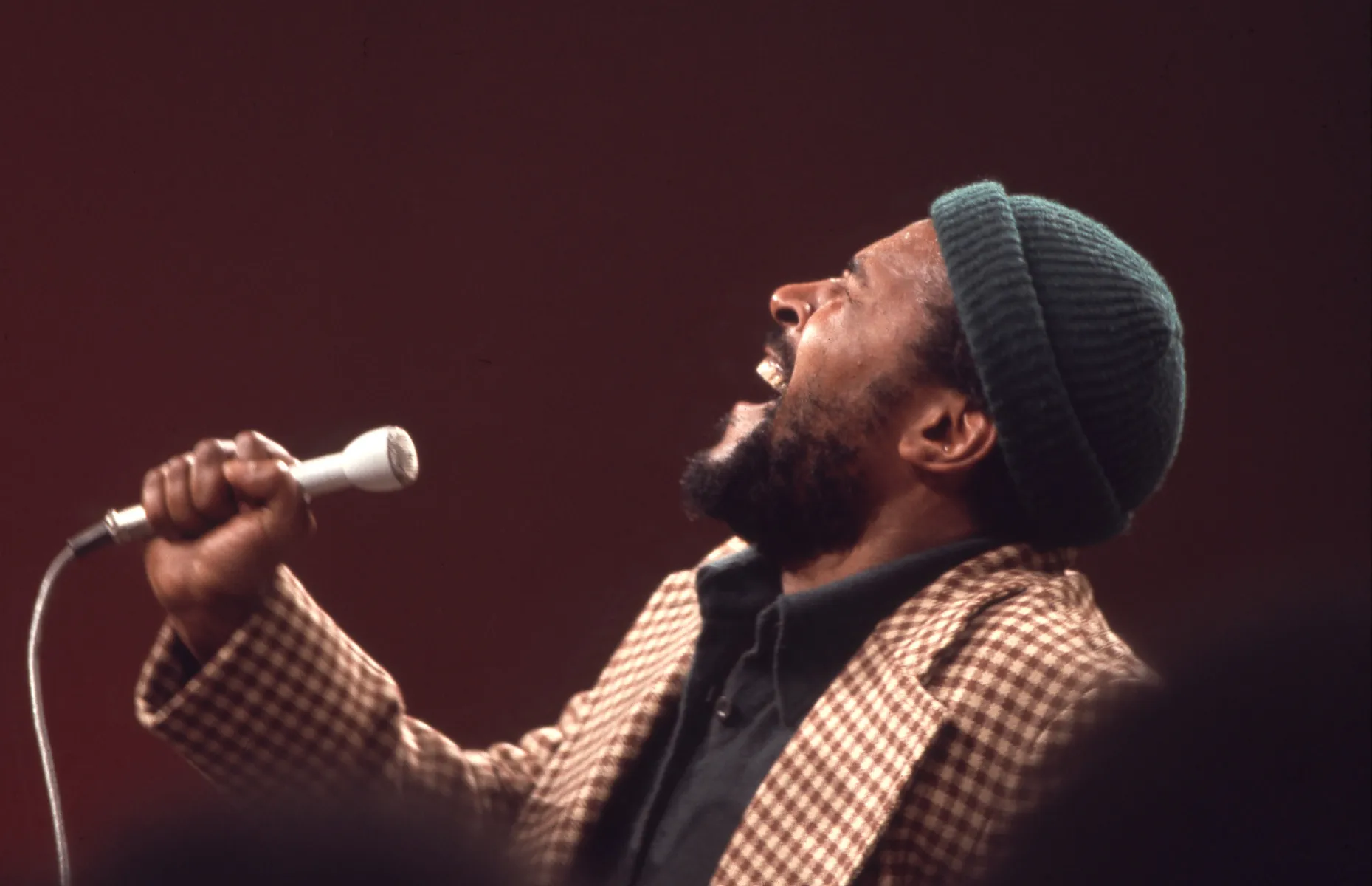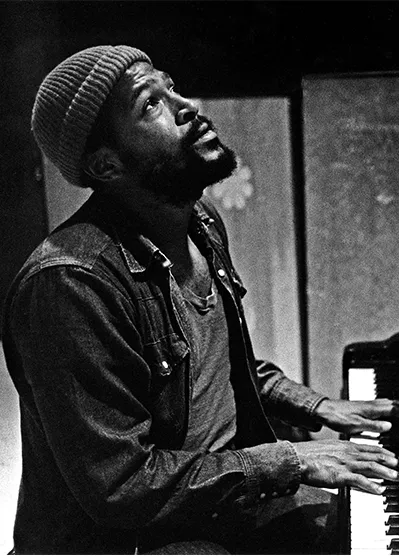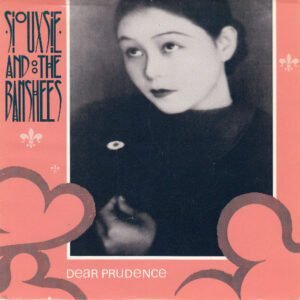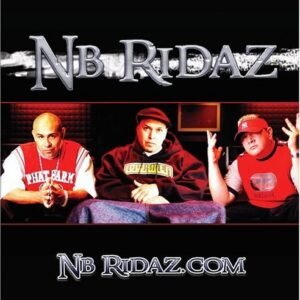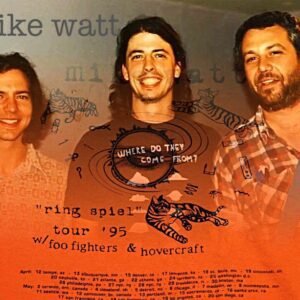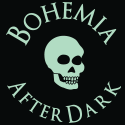Marvin Gaye – Sexual Healing
Description
Sexual Healing” is a song recorded by American singer Marvin Gaye from his seventeenth and final studio album, Midnight Love (1982). It was his first single since his exit from his long-term record label Motown earlier in the year, following the release of the In Our Lifetime (1981) album the previous year. It peaked at No. 3 on the Billboard Hot 100 (Gaye’s final top 10 hit) and is listed at number 198 on Rolling Stone’s list of 500 Greatest Songs of All Time. “Sexual Healing” is written and composed in the key of E-flat major and is set in time signature of 4/4 with a tempo of 94 beats per minute.
Background
In the winter of 1981, Marvin Gaye had relocated to Ostend, Belgium, following the end of a European tour amid problems with the Internal Revenue Service and the end of his second marriage. Struggling with depression and cocaine addiction, Gaye had agreed to move to Ostend on the advice of longtime resident Freddy Cousaert. While in Ostend, Gaye began to curb his drug use and recover from his depression, partaking in Ostend’s beaches. Gaye also began cutting ties with his longtime recording label, Motown, following the release of In Our Lifetime, an album he did not consider finished. He said that he would never record with Motown again, and accused it of betraying his creativity.
While still with Motown, Gaye had received offers from labels including I.R.S. Records, Arista Records and Elektra Records; afterward, he sought to make a deal with CBS Records after they offered him a contract. CBS agreed to sign him and help clear his financial debt, and spent a year negotiating. In the meantime, Gaye needed spending money, so Cousaert set him up with a month-long England tour between June 13 and July 1, 1981. The tour was called “A Heavy Love Affair Tour 1981”, named after his song “Heavy Love Affair“, from In Our Lifetime. After returning to Belgium that July, Gaye performed two shows at Ostend’s Casino Kursaal on July 3 and 4, 1981. The tour’s commercial and critical success further renewed Gaye’s musical confidence.
Production
At the end of the tour, two of Gaye’s musicians, Gordon Banks and Odell Brown, had decided to stay in Ostend as Gaye had been planning on new musical material after being exposed to reggae music while in England. With Brown and Banks, Gaye created and composed an instrumental track that featured reggae overtones, recorded in October 1981. Gaye used a Roland TR-808 drum machine to create the percussion; he was drawn to the instrument because he could use it to create music without other musicians or producers.
Gaye was still working on the track when David Ritz, then a reviewer for Rolling Stone, arrived at Ostend to locate Gaye, despite Gaye’s and Couseart’s rules that no music critic would be allowed to talk to the singer. The story has been disputed on how the lyrics to “Sexual Healing” were devised. Ritz claims that Gaye had been viewing sadomasochism comic books and advised Gaye he needed “sexual healing”. When Ritz explained to Gaye what that meant, Gaye told him to “write a poem” while Gaye came up with the melody. However, Gaye’s closest friends dispute this.
In an interview with HUMO in 1994, Cousaert claimed the only songwriters were Gaye and Brown and stated Ritz’s contribution was the title. In Frankie Gaye‘s memoirs, My Brother, Marvin, the singer’s brother claimed Ritz had told him, “not only are you sexy, your music is healing,” inspiring Gaye to write the lyrics himself. Gordon Banks told The Atlantic in 2012 that the conversation between Gaye and Ritz had nothing to do with Marvin’s S&M collection but because Gaye had been intrigued by Amsterdam‘s red light district, to which Ritz replied that Gaye needed sexual healing but said he had nothing to do with the creation of the song. Odell Brown stated he never met Ritz and assumed Ritz was just there for an interview for Rolling Stone. Though Gaye himself acknowledged Ritz for coming up with the song title, Ritz sued Gaye for $15 million for partial credit. Though Ritz was eventually credited after settling with Gaye’s estate following his death, his case was dropped due to insufficient evidence in 1983.
Composition
“Sexual Healing” has been described as a post-disco, soul and funk song. It begins with a deep bass drum followed by “tinny” handclaps, “ticky” snare, and “tishy” hi-hats generated by a Roland TR-808 drum machine. The first vocal sounds are of whispers, recorded by singer Harvey Fuqua, an early mentor of Gaye who assisted him in production of the song and its parent album, Midnight Love. Fuqua whispers, “Get up” and “Wake up” four times respectively before the sounds of a rhythmic keyboard. Afterwards, Gaye sings an ad-lib before the first verse.
As Gaye sings the verses, background vocals (provided by Gaye and Gordon Banks) are heard singing, “heal me, my darlin’,” while Gaye sings the lyrics. During the chorus, sounds of a harmonious synthesizer are heard before Gaye reaches a vocal bridge, that is led by Gaye and Gordon Banks providing a rhythm guitar solo. In the album version of the song, Fuqua’s whispers are repeated in the middle of the song, in the single version, however, Gaye takes Fuqua’s place, singing in part of Fuqua’s words adding more lyrics before returning to the verse. Another bridge follows after the second repeat of the chorus. In different versions of the song, Gaye had added extra lyrics to the second bridge as showcased on the song’s demo tape and on an alternate version of the song. Gaye eventually cut part of the lyrics off.
In the album version, Gaye and Banks’ background vocals immediately come after the second bridge ends, but in the single version, Gaye repeats the vamp he had sung at the ending of the first bridge, this time with Fuqua’s whispers added. The song ends with Gaye repeating the chorus line. As it fades out, Gaye can be heard singing, “please don’t procrastinate, it’s not good to masturbate.”
Critical reception
In his review of Midnight Love for Rolling Stone, Dave Marsh described “Sexual Healing” as a track that was “sort of a polemic for the power of rampant humping.” Blender described it as “the plaintively blue-balled model for basically every slow jam” since its release. An AllMusic reviewer stated Gaye had “concocted a pioneering percussive sound that was balladic in taste but stimulating in feel.” In its end-year lists of 1982, Rolling Stone, NME, and The Village Voice listed it as one of the “songs of the year” with the latter two ranking it at number two. People described it as “America’s hottest pop-culture turn-on” since Olivia Newton-John‘s single “Physical“.
“Sexual Healing” won several music industry awards. At the 1983 Grammy Awards, the song won Gaye two Grammys, including Best Male R&B Vocal Performance and Best R&B Instrumental Performance.[24] Gaye’s performance of the song later made it into the compilation album, Grammy’s Greatest Moments Volume I, in 1994. The American Music Awards recognized the track for Favorite Soul/R&B Single. “Sexual Healing” sold over two million units in its standard 45 RPM single format and was certified platinum by the Recording Industry Association of America. The digital sales of “Sexual Healing” reached 500,000 downloads and was certified as a gold single in 2005. Also issued as a mastertone, this format was certified platinum in 2007.
Personnel
Credits sourced from The Atlantic, Electronic Sound, and the original album liner notes
- Marvin Gaye – lead and backing vocals, Roland Jupiter-8 synthesizers, Fender Rhodes electric piano, Hammond organ, Roland TR-808 programming, finger cymbals
- Gordon Banks – electric guitars, backing vocals
- Harvey Fuqua – backing vocals


